Key takeaways:
- Data ownership policies define rights over data, influencing organizational efficiency and collaboration.
- Clear roles and responsibilities enhance accountability, security, and foster a culture of engagement among team members.
- Open communication and documentation of data ownership practices are essential for operational success and integrity.
- Empowering employees through ownership leads to improved decision-making and pride in their contributions to data management.

Understanding data ownership policies
Data ownership policies define who has rights to the data created, collected, and processed within an organization. Reflecting on my own experiences, I recall grappling with data agreements in my previous job; it was a learning curve realizing that ownership influences how information can be utilized and shared. Have you ever wondered how these policies can affect the way your organization operates day-to-day?
I often find that organizations overlook the emotional aspect of data ownership. When employees feel that their contributions are valued and that they have a say in how data is managed, it cultivates trust and transparency. For instance, in a past project, clarifying these policies led to more engaged team discussions and fostered a sense of shared responsibility among team members.
Understanding data ownership is not just about legalities; it’s also about navigating relationships within a company. I remember discussing data usage with my colleagues and realizing that conflicting perceptions could lead to tension. It makes you think: when data ownership is unclear, could it create unnecessary friction that hinders collaboration?
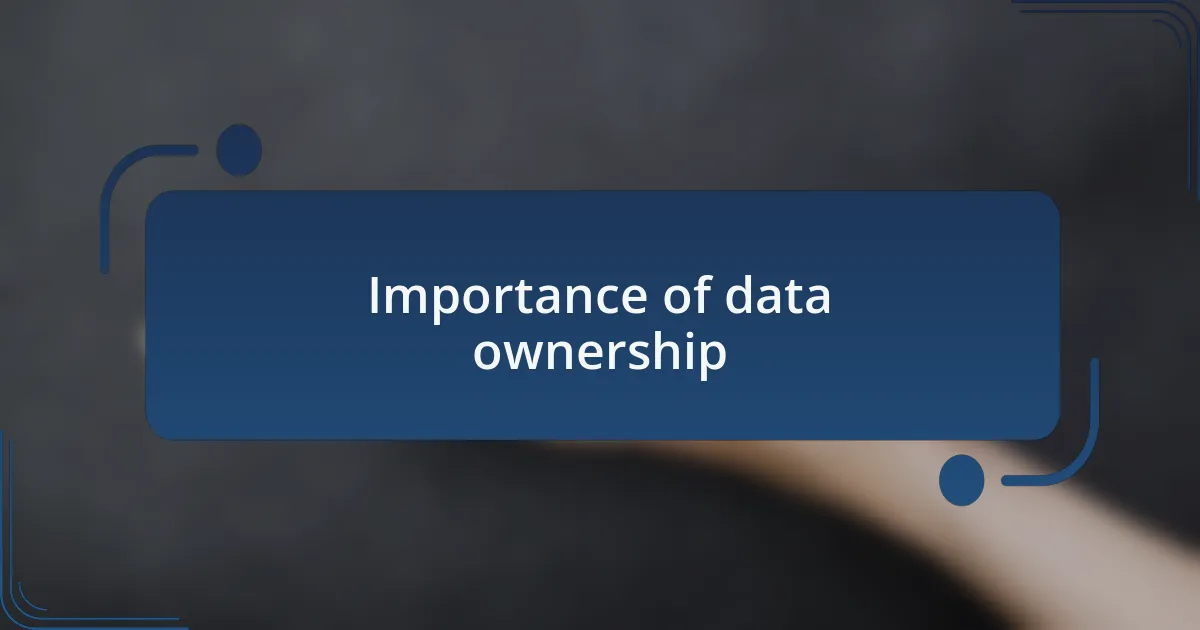
Importance of data ownership
Data ownership is crucial because it directly impacts how effectively an organization can use its information. I’ve seen firsthand how a clear understanding of data ownership can streamline processes. In one scenario, there was a project stalled due to misunderstandings around who had the right to access certain data. Once we clarified those boundaries, it was like a weight lifted—communication flowed more freely, and decisions could be made swiftly.
Moreover, when data ownership is clearly defined, it enhances accountability and security. I remember a time when the lack of clarity led to a data breach incident, which could have been avoided with established ownership protocols. It begs the question: how much risk are organizations willing to take when ownership isn’t transparent? My experience suggests that when employees know who controls the data, they also feel more responsible for its security.
Lastly, the emotional aspect of data ownership cannot be overstated. I have witnessed how empowering team members by involving them in data discussions makes them more invested in its integrity. Have you observed that when people feel ownership over what they manage, they tend to take greater pride in their work? When organizations prioritize data ownership, they don’t just enhance operational efficiency; they also cultivate a motivated and engaged workforce.
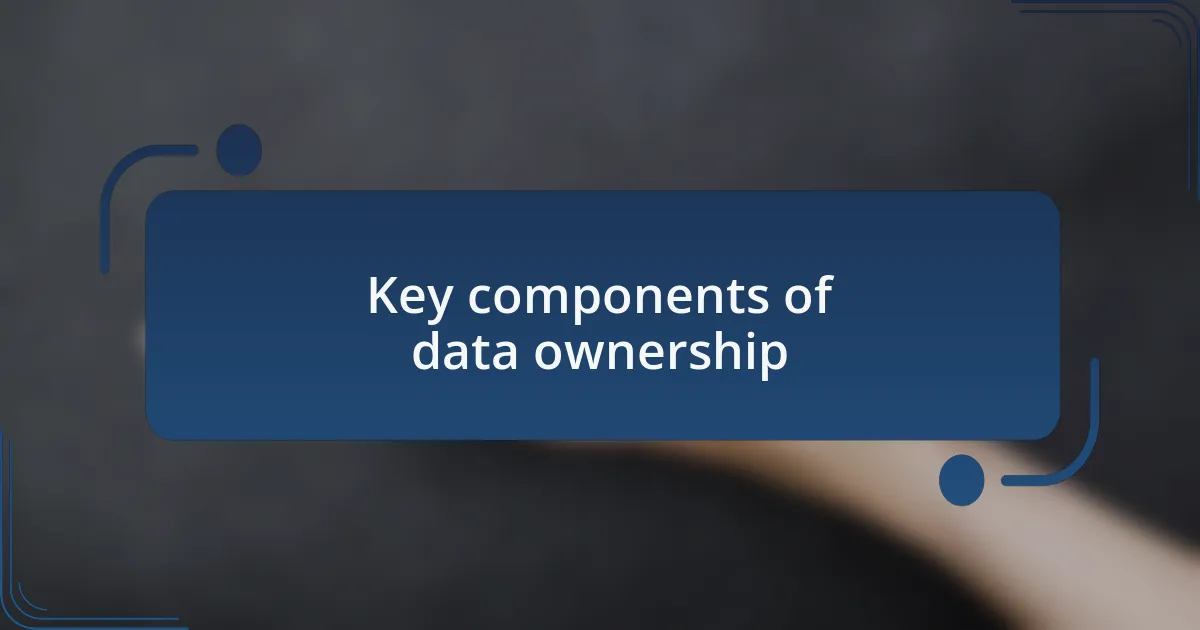
Key components of data ownership
The essence of data ownership revolves around clarity of roles and responsibilities. In my experience, organizations that specify who owns what data minimize confusion significantly. I recall a situation where a project hit a snag because team members were uncertain about who controlled the crucial customer data. Just a simple chart outlining data custodianship transformed the chaos into a well-coordinated effort.
Another key component is access and control. Data ownership also defines who can access specific data and what they can do with it. I once worked with a team that struggled because the data access was not well-defined, leading to overlapping responsibilities and frustration. By implementing strict access controls that lined up with ownership, we not only eased the tension but also enhanced data security—something every organization should prioritize. Have you ever considered how access policies can empower your team, or do they often feel like barriers to their work?
Lastly, documentation plays a vital role in data ownership. From my perspective, having clearly documented data ownership policies ensures continuity and consistency. There was a time when I encountered a situation where a crucial document was lost, and it took ages to retrace ownership rights. Clear and accessible documentation could have made all the difference, saving time and resources. Think about it: when data ownership is well-documented, it becomes easier to train new team members and maintain data integrity over time.
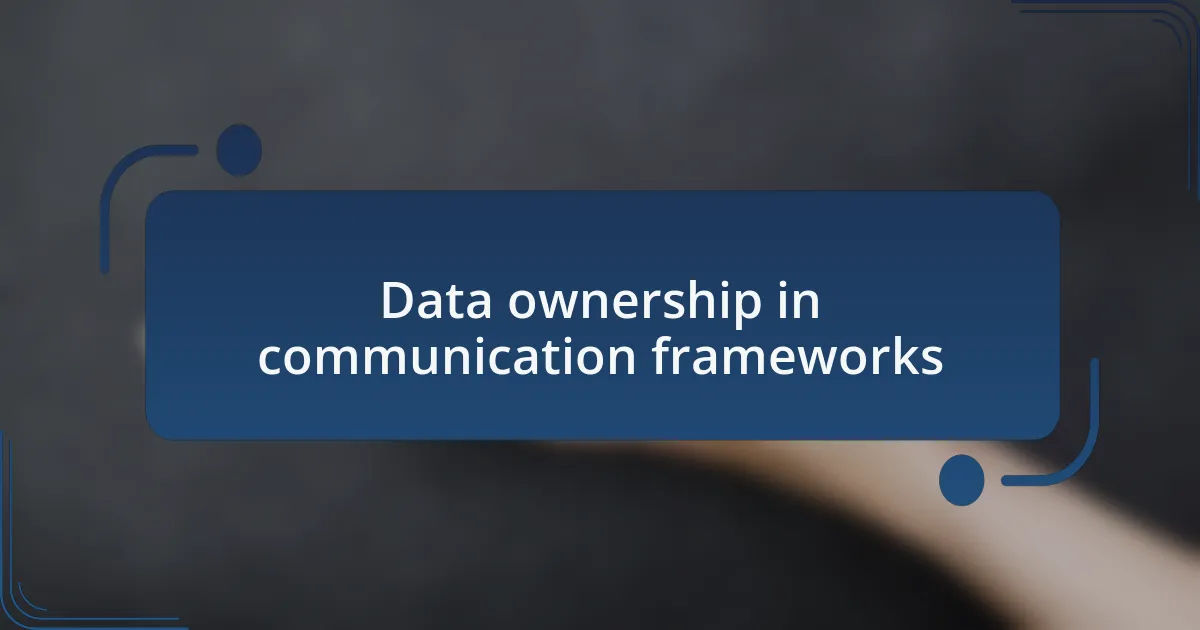
Data ownership in communication frameworks
Data ownership in communication frameworks isn’t just about assigning roles; it’s about fostering accountability within the team. I’ve observed that when team members feel a sense of ownership over their data responsibilities, it significantly boosts their motivation. I once facilitated a workshop where we explored data ownership concepts, and the enthusiasm was palpable when participants realized their input could directly influence data quality.
Moreover, the movement towards transparency in data ownership enhances trust among team members. I remember collaborating on a project where unclear data ownership led to skepticism and reluctance to share insights. Once we clarified who owned which data elements, people started contributing more openly, realizing that everyone’s input played a role in the big picture. Isn’t it interesting how simply clarifying ownership can transform a team’s dynamics and lead to more effective communication?
Additionally, considering the technological tools that support data ownership can’t be overlooked. In my experience, utilizing collaborative software allowed for smooth updates on who owned what data. I recall a time when our team’s reliance on email led to confusion and lost updates. With the right communication framework, we turned this chaos into clear visibility, reinforcing data ownership in a seamless manner. What tools do you use to ensure data ownership within your team?
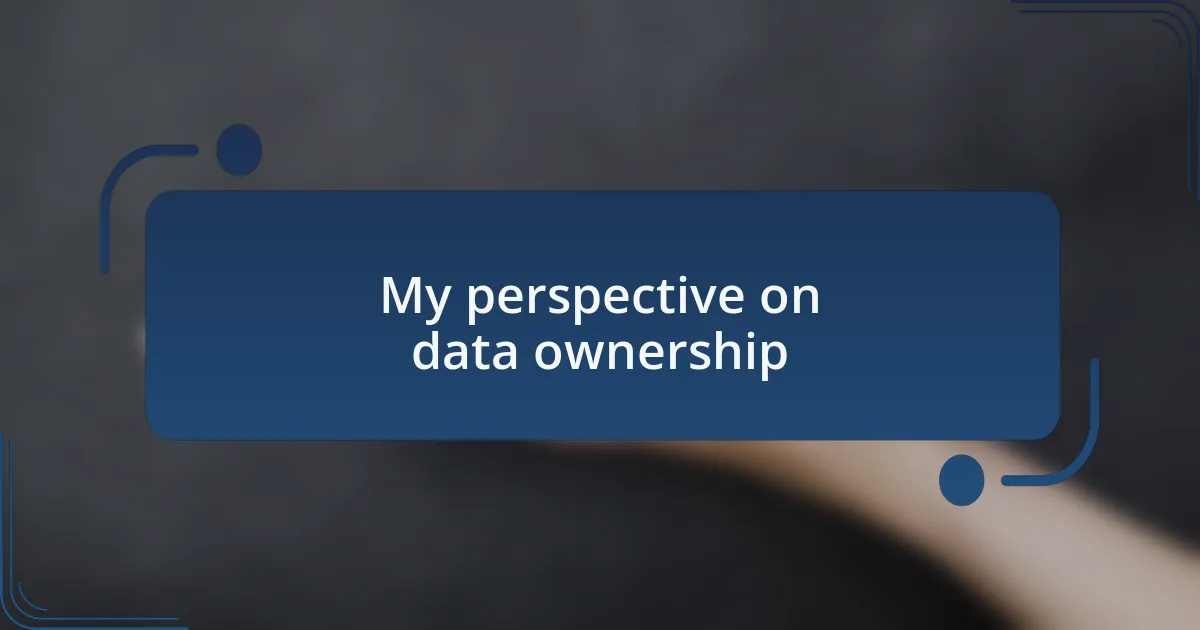
My perspective on data ownership
When I think about data ownership, I can’t help but reflect on my own experiences navigating various projects. I’ve noticed that when individuals take ownership of specific datasets, it encourages them to dig deeper into the information. I remember working on a team where one member was particularly passionate about customer feedback data. Their ownership sparked discussions that led to actionable insights, highlighting how engagement can enhance not just the data itself but also the decision-making process.
The emotional connection to data ownership can’t be underestimated. I often felt a sense of pride when I took responsibility for certain metrics that directly tied to our team’s goals. There was a project where I championed the sales data analysis. My colleagues rallied around it, seeing how our contributions meshed together to create a clearer picture of our market. This unity forged stronger bonds in our team, making data ownership feel less like a chore and more like a collaborative mission.
I often wonder how different organizations approach data ownership. Do they empower their employees to take charge, or do they impose strict guidelines that hinder creativity? From my perspective, fostering an environment where individuals feel autonomous in their roles creates a culture of innovation. In a former role, we initiated open discussions about who was responsible for what data, and this transparent approach not only clarified roles but also ignited a collective interest in improving our data management practices. How do you encourage ownership in your organization?
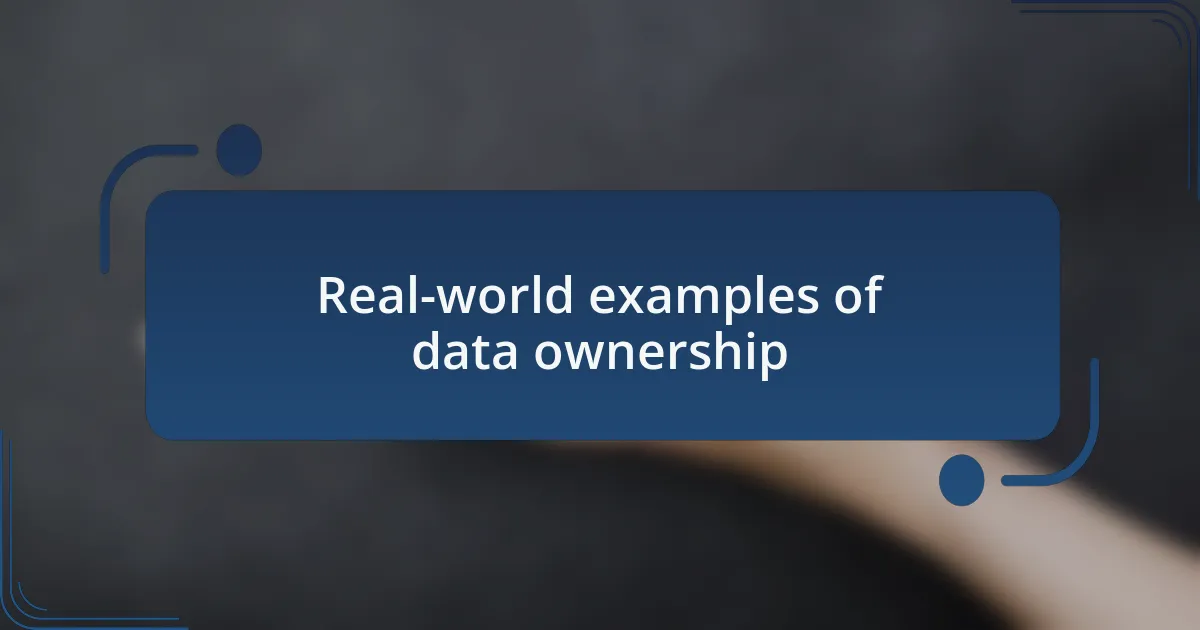
Real-world examples of data ownership
In the tech industry, companies like Google and Facebook exemplify data ownership through their organizational structures. I recall reading about how these giants have dedicated teams that are responsible for specific types of data—from user privacy to ad performance metrics. This clear delineation not only fosters accountability but also sparks deeper analysis, as team members often become specialists in their domains. Doesn’t it make you wonder how having that level of clarity impacts the overall effectiveness of data usage in decision-making?
On a smaller scale, I once collaborated with a nonprofit organization that focused on community health data. Each department owned different datasets, from patient surveys to treatment outcomes. I remember how empowering it felt to present our findings at the annual meeting, knowing that my insights about program effectiveness were based on data I had directly managed. This sense of ownership not only propelled our initiatives forward but also highlighted the importance of data integrity. How can organizations replicate this model to enhance their operational success?
I’ve also noticed industries like finance leveraging data ownership practices to improve compliance and reporting. In my experience at a financial startup, we assigned specific team members to own customer transaction data. This ownership created a culture of diligence and responsibility, as individuals took pride in safeguarding sensitive information. The result? Our compliance scores climbed significantly, illustrating how ownership can drive commitment to data governance. Have you seen similar results in your own work?
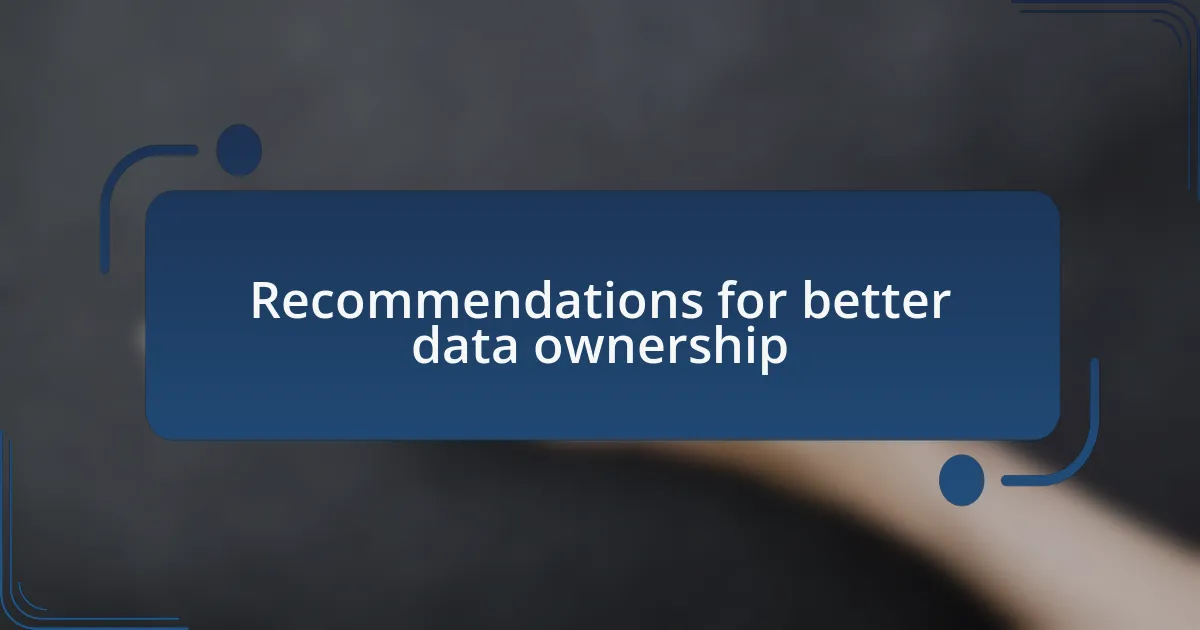
Recommendations for better data ownership
To enhance data ownership, organizations should establish clear roles and responsibilities for data management. From my experience, when team members understand their specific data ownership, it cultivates a sense of pride and accountability in their work. How powerful is it to know you are the steward of vital information that shapes decisions?
Creating a culture that encourages open communication about data practices is essential. At a previous job, we held regular workshops where team members shared insights on data challenges and successes. This not only improved our strategies but also fostered an environment where everyone felt valued in their contributions. Doesn’t it resonate when teams collaborate to refine their grasp on data, ultimately leading to informed and ethical decision-making?
Investing in continuous training on data management policies can significantly impact ownership. In my own journey, I benefited from a comprehensive training program that focused on data ethics and stewardship. It made me realize the nuances of data handling and encouraged deeper engagement with the data I was tasked to manage. Isn’t it remarkable how knowledge empowers individuals to take actions that align with both ethical standards and organizational goals?